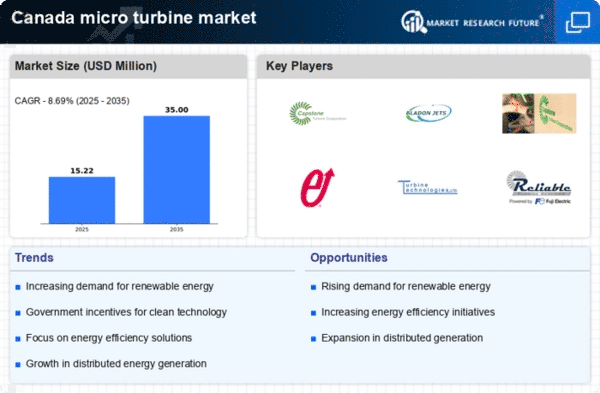Rising Energy Costs
The micro turbine market in Canada is surging due to rising traditional energy costs. As electricity prices continue to climb, businesses and consumers are increasingly seeking alternative energy solutions. Micro turbines, which offer efficient and cost-effective energy generation, are becoming an attractive option. The ability to generate power on-site can lead to significant savings, particularly for industries with high energy demands. Energy costs in Canada are projected to rise by about 10% in 2025, driving interest in micro turbine technology. This trend indicates a shift towards decentralized energy production, positioning the micro turbine market as a viable solution for both residential and commercial applications.
Environmental Regulations
Stringent environmental regulations in Canada are significantly influencing the micro turbine market. The government has implemented various policies aimed at reducing greenhouse gas emissions and promoting sustainable energy practices. These regulations create a favorable environment for micro turbine adoption, as they produce lower emissions compared to conventional fossil fuel-based systems. In 2025, it is estimated that compliance with these regulations will drive a 15% increase in the adoption of renewable energy technologies, including micro turbines. This regulatory landscape not only encourages innovation within the micro turbine market but also aligns with Canada's commitment to achieving its climate goals.
Technological Innovations
Technological innovations are playing a crucial role in shaping the micro turbine market in Canada. Advances in materials science and engineering have led to the development of more efficient and reliable micro turbines. These innovations enhance performance, reduce maintenance costs, and extend the lifespan of the turbines. In 2025, the market is expected to witness a 20% increase in efficiency due to these technological advancements. Furthermore, the integration of smart grid technologies with micro turbines allows for better energy management and optimization. This synergy between technology and energy generation positions the micro turbine market as a key player in the transition towards a more sustainable energy future.
Support from Local Governments
Local governments in Canada are increasingly recognizing the benefits of micro turbines and are providing support to encourage their adoption. This support often comes in the form of grants, subsidies, and favorable zoning regulations that facilitate the installation of micro turbines. In 2025, it is projected that local government initiatives will lead to a 25% increase in micro turbine installations across various sectors. This proactive approach not only stimulates the micro turbine market but also fosters community engagement in renewable energy projects. The collaboration between local authorities and businesses is likely to enhance the overall growth trajectory of the micro turbine market.
Increased Awareness of Energy Independence
There is a growing awareness among Canadian consumers and businesses regarding the importance of energy independence, which is positively impacting the micro turbine market. As energy security becomes a priority, many are exploring decentralized energy solutions to reduce reliance on traditional power grids. Micro turbines offer a practical means to achieve this independence, allowing users to generate their own electricity. In 2025, it is anticipated that the demand for energy independence will contribute to a 12% growth in the micro turbine market. This trend reflects a broader shift towards self-sufficiency in energy production, aligning with the values of sustainability and resilience.
















